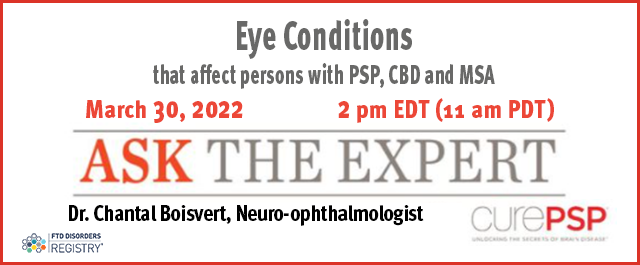PRESS & NEWS
CurePSP Ask the Expert: March 30, 2022

Ask the Expert Chantal Boisvert, MD, OD, Associate Professor of Ophthalmology at Duke University Eye Center, will address eye conditions that may affect persons diagnosed with progressive supranuclear palsy (PSP), corticobasal degeneration (CBD), and multiple system atrophy (MSA) during a webinar on Wednesday, March 30, 2022. The one-hour program begins at 2:00 p.m. Eastern Daylight…
Ask the Expert
Chantal Boisvert, MD, OD, Associate Professor of Ophthalmology at Duke University Eye Center, will address eye conditions that may affect persons diagnosed with progressive supranuclear palsy (PSP), corticobasal degeneration (CBD), and multiple system atrophy (MSA) during a webinar on Wednesday, March 30, 2022.
The one-hour program begins at 2:00 p.m. Eastern Daylight Time (11:00 a.m. Pacific).
Persons diagnosed with PSP, CBD and MSA often have significant issues with their eyes and their vision, such as opening and closing their eyes, blinking, decreased vision, dry eyes, and difficulty reading or looking down. This webinar will include possible ways to improve these issues. Dr. Boisvert will also answer questions that were submitted during registration.
Registration is required. Links to the webinar will be emailed to registrants after registration, two hours before the event, and fifteen minutes before the event.
Dr. Boisvert, a neuro-ophthalmologist, received her medical degree from Laval University School of Medicine and completed her residency in ophthalmology at the University of Montreal Hospitals.
Prior to joining Duke, she was Associate Clinical Professor and Director of Medical Education in Ophthalmology at UCI Gavin Herbert Eye Institute, where she assumed the majority of the medical student teaching load in ophthalmology. In September 2019, she was recruited to Duke Eye Center, where she now serves as Chief of the Neuro-Ophthalmology Division.
Her clinical interests include all aspects of neuro-ophthalmology, including double vision and strabismus (misalignment of the eyes). She specializes in the diagnosis and treatment of a variety of optic nerve, cranial nerve, and brain disorders affecting the vision.
Together we can find a cure for ftd
The FTD Disorders Registry is a powerful tool in the movement to create therapies and find a cure. Together we can help change the course of the disease and put an end to FTD.
Your privacy is important! We promise to protect it. We will not share your contact information.



